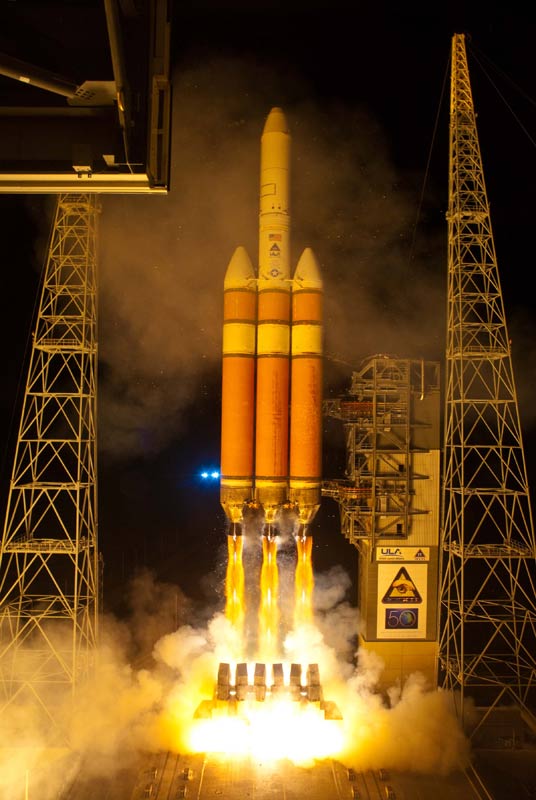Rocket Launch Provider to Scale Back Workforce

ES MENUIERES, France – United Launch Alliance (ULA) will reduce its work force by 19 percent over the next few years as it weeds out unneeded overlaps in Atlas and Delta rockets and finds other efficiencies, ULA Chief Operating Officer Dan Collins said.
The head-count reduction, which follows a 16 percent staff cut over the past four years, should enable Denver-based ULA to reduce operating costs and offer reduced launch-service prices to its U.S. government customer, he said.
Collins said ULA, established in December 2006, has already surpassed its goal of cutting launch costs by 25 percent over the previous generation of rockets, and that more cost reductions are on the way. [11 Things Americans Will Be Doing in Space in 2011]
His remarks were made Nov. 18 at an industry roundtable during the Global Warfare Symposium in Los Angeles. The conference was organized by the Air Force Association, which recently released a transcript of the session.
The U.S. Federal Trade Commission approved the merger of what had been competing launch-service providers — Lockheed Martin with the Atlas 5 and Boeing with its Delta family — out of concern that, if left to market forces, one of these launch operations might fail. The U.S. Air Force had further argued that a merger would facilitate moving satellites between Atlas and Delta rockets.
Neither the Air Force, nor U.S. regulators, had relied on promised savings in approving ULA’s creation, although Boeing and Lockheed officials had said the merger would permit up to $150 million a year in savings assuming an annual government launch business of $1.5 billion to $2 billion per year.
Since its creation, ULA has launched 45 times, all successfully. It conducted eight launches in 2010 — the same rate as 2009 — and has 12 scheduled in 2011, which would be a record launch rate for the company.
Breaking space news, the latest updates on rocket launches, skywatching events and more!
How to assess the costs associated with a given U.S. government satellite launch has been a subject of debate for years. The analysis is made difficult by the complex web of services provided by the government for a launch in addition to the cash it pays ULA. Moreover, the government pays ULA an annual sum for sustainment of the operation in addition to what it pays for individual Atlas 5 and Delta 4 launches.
Collins said the Boeing Delta and Lockheed Atlas operations in 2006 had a combined work force of 4,400. ULA is now down to 3,700 people and will drop further, to 3,000 assuming a constant level of work, in the coming years, he said.
"In doing this, we've exceeded our promise on savings to the customer … by 30 percent and over the five-year period on which the savings will be looked at, we're going to deliver nearly $800 million of savings due to the consolidation. … I've heard it said that ULA just doesn’t care about saving money, and I’ll tell you, that’s just not the case."
In 2006, the U.S. Air Force and U.S. government regulators, in written statements, said creating a de facto launch monopoly would not lead to lower per-launch costs. Some even assumed costs would rise with the lack of competition, but that the price to pay was worth the benefits to the U.S. Defense Department.
Collins did not specify how ULA has arrived at its $800 million in savings. In the past, the company has said reducing the time required for Atlas and Delta launch campaigns is one way ULA has shaved operating costs.
Further cost cutting could occur as ULA streamlines operations by "eliminating redundancy between the different models of Atlas and Delta where … some of the configurations don’t provide as much value," Collins said.
He urged the government not to force a competitive environment on an industry that may be ill suited to it.
"I’m not saying no to competition, I'm just urging us to be judicious in its use," Collins said. "Our success will be judged not on how widely we used the tool of competition, but … on how wisely we used the tool of competition."
Given the U.S. policy of barring non-U.S. rockets from launching U.S. government satellites, the most likely near-term competition for ULA will be from Space Exploration Technologies (SpaceX) of Hawthorne, Calif., whose Falcon 9 rocket recently completed a demonstration mission of launching into low Earth orbit, and recovering, a cargo capsule. [Photos: SpaceX's Private Dragon Spacecraft's 1st Flight]
SpaceX Chief Executive Elon Musk was sitting with Collins on the panel, and he used the occasion to urge the government to scrap its cost-plus contracting scheme in favor of fixed-price contracts. The cost-plus formula, he said, makes "good people do bad things. … You’re creating an incentive to maximize costs up to the limit of the program being canceled."
"The Air Force has erected enormous barriers to entry at least in the launch market, and made it really very difficult to get in," Musk said. "It’s sort of strange that we have over 30 missions on contract for Falcon 9 — which is a vehicle that has more capability than the Delta 4 Medium — but not one of those is with the Air Force. Why is that?"
SpaceX has a heavy-lift version of the Falcon 9 in development that has yet to fly.
This article was provided by Space News, dedicated to covering all aspects of the space industry.
Peter B. de Selding is the co-founder and chief editor of SpaceIntelReport.com, a website dedicated to the latest space industry news and developments that launched in 2017. Prior to founding SpaceIntelReport, Peter spent 26 years as the Paris bureau chief for SpaceNews, an industry publication. At SpaceNews, Peter covered the commercial satellite, launch and international space market. He continues that work at SpaceIntelReport. You can follow Peter's latest project on Twitter at @pbdes.

